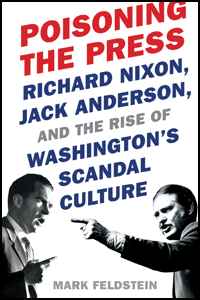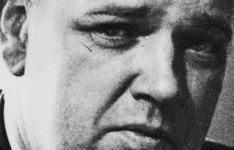Mar 27, 2011
Poisoning the Press: Mark Feldstein
 Poisoning the Press: Richard Nixon, Jack Anderson, and the Rise of Washington’s Scandal Culture
Poisoning the Press: Richard Nixon, Jack Anderson, and the Rise of Washington’s Scandal Culture
Mark Feldstein
(New York: Farrar, Straus and Giroux, 2010)
What former U.S. president attempted the assassination of a prominent American journalist?
Author Mark Feldstein drops readers into an exciting moment in history as a prologue to his new book, Poisoning the Press: Richard Nixon, Jack Anderson, and the Rise of Washington’s Scandal Culture. The former journalist, now journalism professor packages his extensive research into the lives of U.S. President Richard M. Nixon and columnist Jack Anderson. Any mention of Richard Nixon’s career is likely to bring up the name “Whittaker Chambers,” and Feldstein’s book is no exception.
While the book presents both men in context, often comparing them, this reviewer agrees with Greg Waldmann, senior editor at Open Letters Monthly, that Feldstein does not seem to prove his title’s overall claim. Washington’s scandal culture resulted from larger, deeper factors. Feldstein acknowledges the impact of new media technologies. However, books like Garry Wills‘ Bomb Power (2010) support an even darker view of the nature of power and the American presidency. Regardless, Feldstein tracks Nixon and Anderson very ably.
Whittaker Chambers receives mention twice and only in terms of a long-time, favorite tactic of 20th Century defamation: homosexuality.
In the first instance, Feldstein writes:
Throughout his life, Nixon continually returned to the Hiss case as a seminal event… In particular, Nixon fixated on one of the more bizarre sidebars of the affair: homosexuality… It was the ultimate of smears… In the Hiss case, it turned out that Nixon’s key witness, a former Communist named Whittaker Chambers, was, in the indelicate words of J. Edgar Hoover, “an admitted pervert.” Hiss claimed that Chambers framed him as a spy because he was a “spurned homosexual,” who formed “some obscure kind of love attachment” to Hiss and sought revenge “out of jealousy and resentment” after his advances were rebuffed. (p. 40)
Feldstein summarizes the case so that it reads that Hoover and Hiss were both talking publicly about homosexuals and perverts during the Hiss case in 1948-1950. These were words unmentionable in public at that time, hence the power of their implication then and later, an early instance Feldstein does not draw out.
Allen Weinstein quoted Hiss’s calling Chambers a “spurned homosexual” in his 1978 book Perjury (p. 561; phrase appears earlier on pp. 146, 281). In 1976, others were already quoting Hiss (e.g., New York Review of Books). Weinstein indicates that Hiss first used the term in 1976, though he does not state when and where (p. 584.) “Spurned homosexual” has become a stock phrase that continues in use in the 2000s, e.g., Spies (2007) and Nixonland (2008). Where the Hoover quote comes from, Feldstein does not mention, either.
Feldstein’s second mention comes from a now-famous presidential transcript in a later chapter called “Sex, Spies, Blackmail” (which reveals not only Nixon’s gay-bashing attitudes but an alleged plot to kill Anderson):
The President plunged ahead, once again harking back to the Hiss case, which was exposed by his gay accuser, Whittaker Chambers. “Hiss and Chambers, you know, nobody knows that, but that’s a fact about how that began… They were both — ‘that way’.” (p. 184)
Strangely, although Feldstein describes Nixon’s references, he does no digging there: he does not talk about how homosexuality came up during the Hiss case, not even as a book note. Yet, clearly, the homosexuality implied during the Hiss case in and out of court made a major impact on Nixon.
Perhaps most missing are the names of other 20th Century journalists whose careers helped lead up to the possibility of a Jack Anderson. Mentor Drew Pearson receives only a few pages: others far less, if named at all. (Pearson made the cover of TIME magazine in 1948, just as Alger Hiss was indicted for perjury.) It would have been interesting to hear this journalism professor talk about the developments from muckraking prior to World War I.
Also, it would have been interesting to hear Feldstein talk about just how many presidents (among other politicians) become embroiled in political character assassination and other illegal acts. While mentions a bribe to Nixon through brother Donald Nixon, which the Kennedy family uncovered and put forward through Anderson, he takes no further step. (However, Feldstein did point at Kennedy corruption in that event for The Washington Post after the book came out.) Many veteran reporters on Capitol Hill are convinced that activities like Watergate are simply the botched efforts of which the public learns of. They believe many (more) such acts go undetected.
In which case, is Washington’s “scandal culture” really the subject at all?
Perhaps the real subject revealed in this book is the depth of corruption rampant in Washington, of which Nixon and Anderson were merely some of the louder partakers.
Excerpt:
Daily Beast
Interviews:
NPR
Other reviews:
New York Times
Wall Street Journal
Open Letters Monthly
Miami Herald (Associated Press)
Dalles News
American Journalism Review
